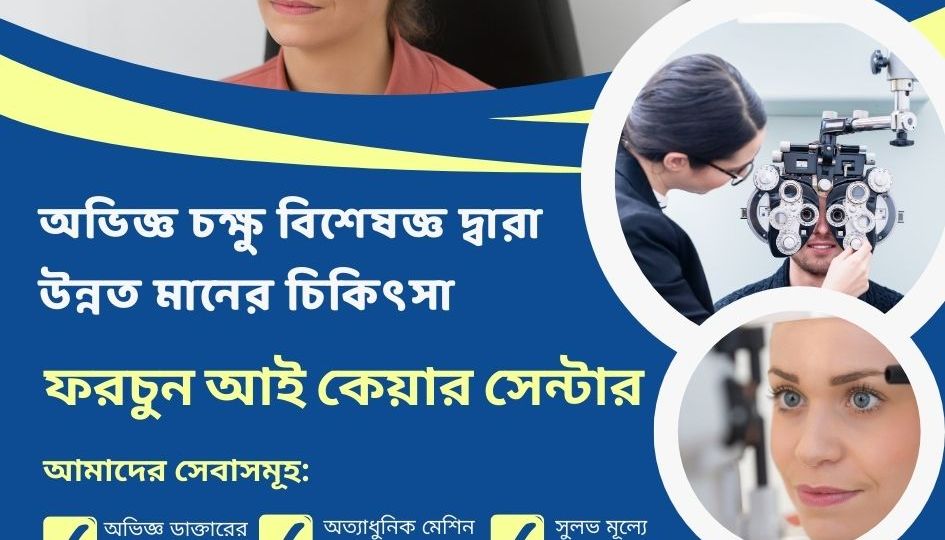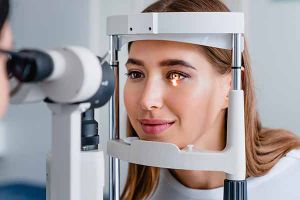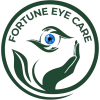
Eye Diseases List and Eye Check Up Center Dhanmondi
Human Eye by Fortune Healthcare Ltd. is a groundbreaking healthcare innovation designed to revolutionize ophthalmology. This cutting-edge technology aims to provide superior vision care and improve overall eye health. With its state-of-the-art features, Human Eye offers advanced diagnostic capabilities, precise surgical interventions, and personalized treatment options. Its high-resolution imaging systems allow for accurate detection and monitoring of ocular conditions, enabling timely intervention and preventing vision loss. Additionally, Human Eye’s ergonomic design ensures patient comfort and ease of use for healthcare professionals. Fortune Healthcare Ltd.’s Human Eye is a game-changer in the field of eye care, bringing innovation and excellence to the forefront of ophthalmology.
Eye Diseases
Eye diseases refer to a wide range of conditions that affect the structure or function of the eye, leading to vision impairment or other symptoms. Some common eye diseases include:
Cataracts: Clouding of the lens, causing blurry vision and decreased color perception.
Glaucoma: Damage to the optic nerve due to increased pressure in the eye, leading to progressive vision loss.
Age-related macular degeneration (AMD): Deterioration of the macula, resulting in central vision loss.
Diabetic retinopathy: A complication of diabetes that damages the blood vessels in the retina, leading to vision problems.
Retinal detachment: The separation of the retina from its underlying tissue, causing sudden vision loss.
Dry eye syndrome: Insufficient tear production or poor tear quality, resulting in dryness, irritation, and discomfort.
Conjunctivitis: Inflammation of the conjunctiva (the clear membrane covering the white part of the eye), causing redness, itching, and discharge.
Retinitis pigmentosa: A genetic disorder that causes gradual degeneration of the retina, leading to night blindness and peripheral vision loss.
Amblyopia (lazy eye): Reduced vision in one eye due to improper development during childhood.
Keratoconus: A condition where the cornea becomes thin and bulges outward, causing distorted vision.
Early detection, regular eye exams, and timely treatment are crucial in managing eye diseases and preserving vision. It is important to consult an ophthalmologist for proper diagnosis and appropriate management of any eye-related concerns.
eyes problems
Eye problems can significantly impact our daily lives and overall well-being. Fortunately, advancements in healthcare have led to various solutions to address and manage these issues. From vision correction to treatment of eye diseases, there are options available to improve and protect our vision. Let’s explore some common eye problems and the corresponding solutions.
Refractive Errors: Refractive errors, such as nearsightedness (myopia), farsightedness (hyperopia), and astigmatism, affect the eye’s ability to focus properly, resulting in blurry vision. One of the most common solutions for refractive errors is the use of corrective lenses, such as glasses or contact lenses. These lenses compensate for the specific refractive error, providing clear vision.
Cataracts: Cataracts occur when the natural lens of the eye becomes cloudy, leading to blurred vision and sensitivity to glare. The primary treatment for cataracts is surgical removal of the cloudy lens and replacement with an artificial intraocular lens (IOL). This procedure, known as cataract surgery, is highly effective and can restore clear vision.
Glaucoma: Glaucoma is a group of eye conditions that damage the optic nerve, often due to increased intraocular pressure. Treatment options for glaucoma include medications (eye drops), laser therapy (trabeculoplasty), or surgery (trabeculectomy) to lower the eye pressure and preserve vision.
Age-related Macular Degeneration (AMD): AMD is a degenerative condition affecting the macula, a small area in the center of the retina. Treatment options for AMD vary depending on the type and stage of the disease. They may include medications (anti-VEGF injections) to slow down the progression of wet AMD, nutritional supplements, and lifestyle modifications to support overall eye health.
Dry Eye Syndrome: Dry eye syndrome occurs when the eyes do not produce enough tears or produce poor-quality tears. Artificial tears, lubricating eye drops, and ointments can provide relief by moisturizing and soothing the eyes. In more severe cases, prescription medications or procedures to improve tear production and retention may be recommended.
Conjunctivitis: Conjunctivitis, commonly known as pink eye, is an inflammation of the conjunctiva, the thin, clear tissue covering the white part of the eye. Treatment for conjunctivitis depends on the cause (bacterial, viral, or allergic). It may involve the use of antibiotic or antiviral eye drops, antihistamines, or artificial tears to alleviate symptoms and promote healing.
It’s important to remember that proper diagnosis and treatment should be sought from qualified healthcare professionals, such as ophthalmologists or optometrists. They can provide personalized recommendations based on individual eye conditions, ensuring the most effective solutions are applied. Additionally, regular eye exams are crucial in detecting and addressing eye problems early, even before symptoms arise.
In conclusion, advancements in eye care have provided a wide range of solutions for various eye problems. Whether it’s refractive errors, cataracts, glaucoma, AMD, dry eye syndrome, or conjunctivitis, there are treatments and interventions available to improve vision, alleviate discomfort, and preserve eye health. By seeking professional care and following recommended treatments, individuals can enjoy clearer vision and better eye health, enhancing their overall quality of life.
what are the worst eye diseases
There are several eye diseases that can have severe consequences and significantly impact a person’s vision. Here are some of the worst eye diseases:
Retinal Detachment: Retinal detachment occurs when the retina, the light-sensitive tissue lining the back of the eye, separates from its normal position. It can lead to sudden vision loss and requires immediate medical attention to prevent permanent vision impairment.
Advanced Glaucoma: Glaucoma is a group of eye diseases characterized by damage to the optic nerve, often caused by increased intraocular pressure. If left untreated or uncontrolled, glaucoma can lead to irreversible vision loss and blindness.
Advanced Age-related Macular Degeneration (AMD): AMD is a progressive eye disease affecting the macula, the central part of the retina responsible for sharp central vision. In advanced stages, AMD can result in significant vision loss, making it challenging to perform daily activities like reading or recognizing faces.
Diabetic Retinopathy: Diabetic retinopathy is a complication of diabetes that damages the blood vessels in the retina. In advanced stages, it can cause severe vision loss and even lead to blindness if left untreated.
Retinitis Pigmentosa: Retinitis pigmentosa is a genetic disorder that causes the progressive degeneration of the retina. It typically results in night blindness and a narrowing of the visual field, leading to significant vision impairment over time.
Uveitis: Uveitis refers to the inflammation of the uvea, the middle layer of the eye. It can cause severe eye pain, light sensitivity, and blurred vision. If not properly managed, chronic uveitis can result in permanent vision loss.
Corneal Disorders: Various corneal disorders, such as keratoconus or corneal dystrophy, can cause significant vision problems. These conditions can lead to distorted vision, corneal scarring, or corneal thinning, resulting in reduced visual acuity.
It’s important to note that the severity and impact of these eye diseases can vary from person to person. Early detection, regular eye exams, and appropriate treatment are crucial for managing these conditions and minimizing their impact on vision. If you suspect any issues with your eyes or experience changes in vision, it is recommended to consult with an ophthalmologist or eye care specialist for proper diagnosis and treatment.
Fortune Eye Check Up Center Dhanmondi

Fortune Eye Check Up Center in Dhanmondi is a leading healthcare facility dedicated to providing comprehensive eye care services. Located in the heart of Dhanmondi, this center is known for its state-of-the-art facilities, experienced medical professionals, and commitment to excellence in eye health.
The center offers a wide range of services to cater to various eye care needs. From routine eye exams to specialized treatments, Fortune Eye Check Up Center ensures that patients receive personalized attention and the highest quality of care. Their team of skilled ophthalmologists, optometrists, and supporting staff work together to deliver accurate diagnoses and effective treatment plans.
At Fortune Eye Check Up Center, they understand the importance of regular eye check-ups in maintaining optimal vision and detecting potential eye problems early on. Their comprehensive eye exams assess visual acuity, refractive errors, and evaluate the health of the eye’s structures. Through advanced diagnostic equipment and techniques, they can detect conditions like cataracts, glaucoma, diabetic retinopathy, and macular degeneration.
The center also offers specialized treatments for various eye conditions. Whether it’s cataract surgery, glaucoma management, corneal disorders, or refractive surgeries like LASIK, Fortune Eye Check Up Center is equipped with cutting-edge technology and skilled surgeons to provide the best possible outcomes for their patients.
In addition to their clinical expertise, Fortune Eye Check Up Center prides itself on maintaining a patient-centric approach. The staff is known for their friendly demeanor, professionalism, and dedication to patient comfort. They strive to create a warm and welcoming environment for all individuals seeking eye care services.
Furthermore, Fortune Eye Check Up Center values convenience and accessibility for their patients. They offer flexible appointment scheduling, streamlined processes, and efficient service delivery to ensure a smooth and hassle-free experience.
In conclusion, Fortune Eye Check Up Center in Dhanmondi is a reputable institution that offers comprehensive eye care services. With a focus on advanced technology, experienced professionals, and patient-centered care, they strive to enhance the vision and overall eye health of their patients. Whether it’s a routine eye exam or specialized treatment, individuals can trust Fortune Eye Check Up Center for exceptional eye care services in Dhanmondi.
Fortune Healthcare Ltd.
23/C, Zigatola, Dhanmondi, Dhaka, Bangladesh
Contact: +880 15522 21222
Email: fortunehealthc@gmail.com

